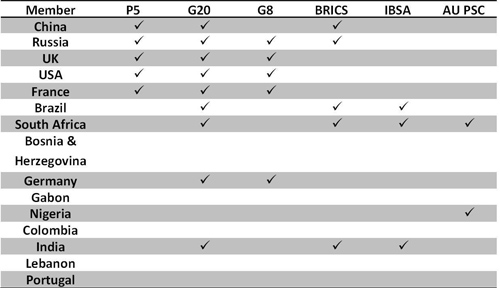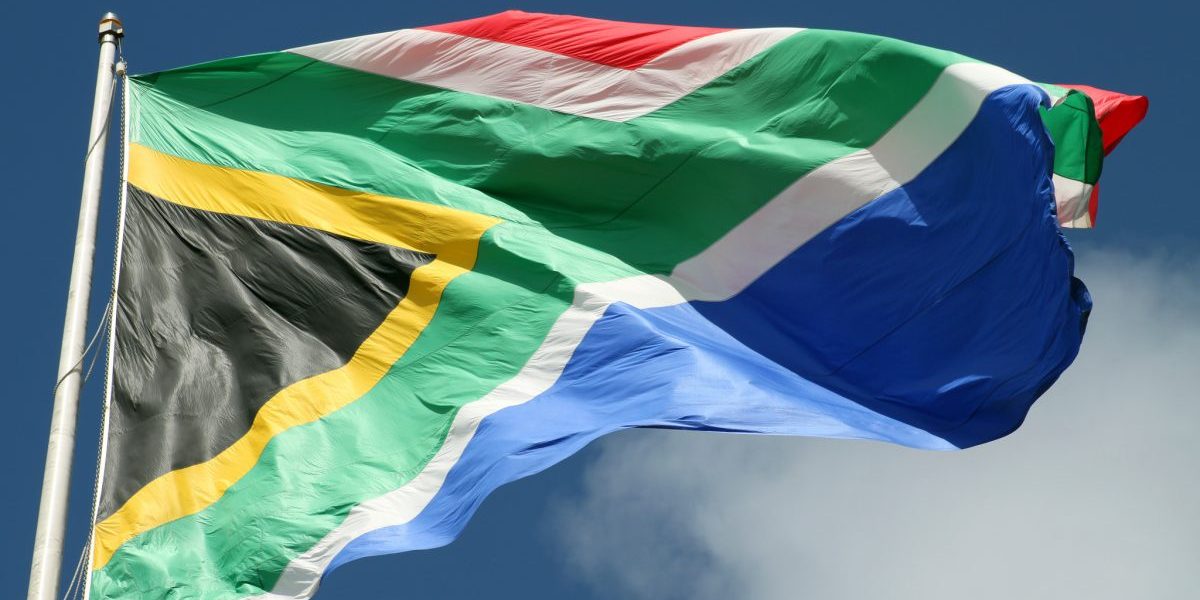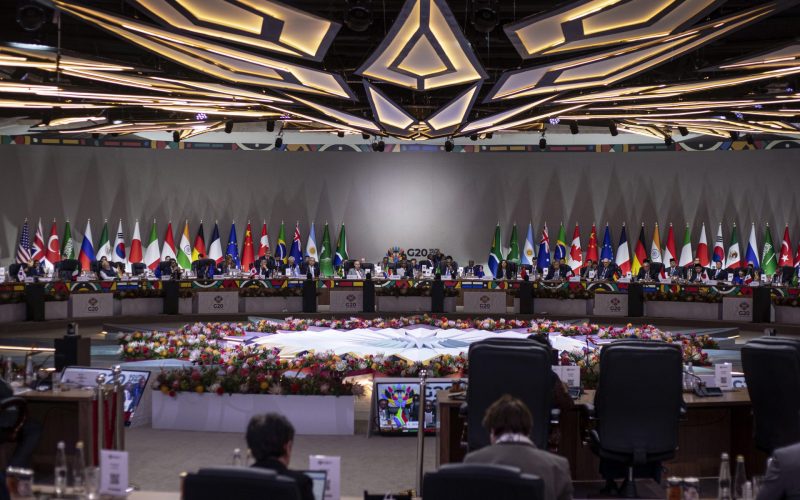This analysis tracks South Africa’s voting patterns during the country’s first and second terms, so far, (until the end of February 2012) on the Security Council to assess its record against its stated UNSC foreign policy objectives. The picture that emerges is one of a more confident South Africa in the UNSC with an increase in the number of co-sponsored resolutions and a strong focus on African issues. The overall outcome so far appears to show some success in South Africa’s pursuit of its ‘African Agenda’ in the UNSC.
Following the announcement of South Africa’s successful bid for a second term as a non-permanent member on the UNSC, the Minister of International Relations and Cooperation, Maite Nkoana-Mashabane stated that South Africa’s foreign policy in the Council would be driven primarily by the goals of achieving greater South-South cooperation; North-South cooperation; the promotion of the African continent; the support of multilateralism in relation to issues of international peace and security; and lastly, closer cooperation with other African non-permanent members on the UNSC. The Minister also emphasised that South Africa would continue to promote stronger cooperation between the UNSC and the AU Peace and Security Council (AU PSC). Finally, she made it clear that the configuration of the Security Council at the start of South Africa’s second tenure was representative of the reformed membership envisioned by the country. From the African continent it included South Africa and Nigeria, from Europe it included Germany, from South Asia it included India, and from Latin America it included Brazil. The only other country that has consistently lobbied to serve on a reformed UNSC is Japan, which was not included in the 2011 configuration.

As South Africa nears the end of its second tenure, several questions arise. Will it continue to be a driving force behind the promotion of the African agenda in the UNSC? Will it succeed in pushing for more democratic permanent representation in the Council? And will it be the African representative if this happens?
South Africa’s first tenure on the UNSC began in January 2007 and ran until the end of December 2008. The country is currently serving its second, almost back-to-back term on the Council, which began in January 2011 and will finish in December 2012. In examining the role that South Africa has played while on the UNSC and how successful it has been at pursuing its foreign policy objectives, it is useful to look at the range of UNSC resolutions passed during these two terms. To begin with, it should be noted that the continent of Africa takes primacy in terms of the overall number of resolutions that have been adopted or considered for adoption , compared to the rest of the world. In 2011, out of a total of 66 resolutions, 43 were on African issues, a staggering 65%; whereas during South Africa’s first tenure, of a total of 123 resolutions, only 56% involved issues on the continent. For example, these consisted of the following issues involving African countries: renewals of existing peacekeeping missions or security forces (Sudan, Central African Republic, Guinea Bissau, Burundi, Libya, Sierra Leone, Côte d’Ivoire, DRC, Western Sahara); new peacekeeping missions (Libya, South Sudan); extension of panel of experts (Sudan); sanctions (Liberia, Eritrea, DRC, Libya, Somalia, Eritrea, Côte d’Ivoire); and various other issues (Rwanda, Somalia, Libya).
Three possible conclusions may be drawn from this trend line. The rest of the world is more stable, conflicts in other parts of the world do not make it to the Security Council, or conflict is on the rise in Africa. The latter seems to be counter-intuitive given rising stability and more frequent elections in Africa over the last decade. However, as the Arab Spring demonstrated, the veneer of greater stability does not automatically translate into better governance or peace. In fact, elections often seem to herald significant instability, such as was the case in Kenya, Côte d’Ivoire and Zimbabwe.

South Africa regards this high incidence of African issues on the Security Council agenda as reason enough for Africa to deserve a permanent seat on the UNSC. This point was made by the Deputy Minister of International Relations and Cooperation, Mr Ebrahim I Ebrahim, in a recent speech given at the University of Limpopo:
“More than 70% of Security Council deliberations are centred around African conflict situations, while six of the UN’s fourteen peacekeeping operations and nearly 80% of its peacekeepers are deployed in Africa, including MONUSCO in the DRC (23,383 personnel) and UNAMID in Sudan (27,501 personnel). Despite this – and the fact that Africa is a huge continent that has 54 member states, representing more than one billion people – not a single African country is a permanent member of the UN Security Council.”
This matter has been at the centre of South Africa’s foreign policy agenda, especially during its second term. However, while the country is pushing for overall democratic reform of the Council, in the interim it appears to be pursuing a strategy of almost back-to-back non-permanent representation on the Council. Such a strategy is appropriate as it ensures continued high level representation for Africa in the Council. In the long run though there remains much scepticism, both as to whether the UNSC will be reformed, and if this occurs, whether South Africa will in fact be Africa’s preferred representative (in terms of the Ezulwini Consensus Africa has proposed two permanent seats for the continent). This point was made clear when South Africa failed to gain enough support within the continent for its bid for the AU chairmanship in January 2011. Although the AU members will vote again on the position in July, how South Africa responds to and strategically approaches the question of African support will be a determining feature of the success of its future aspirations.
While there seems to be an increased focus on Africa, it is useful to look more closely at the nature and substance of the UNSC resolutions passed during this period. Of the 66 resolutions passed by the UNSC in 2011, 40 either extended or renewed a peacekeeping force or a panel of experts’ mandate. In 2007 and in 2008, this number was 41. Further, in 2011, 10 resolutions were passed to renew sanction regimes on countries, such as Liberia, Eritrea, the DRC, Somalia, Cote d’Ivoire and Libya. In 2008 the number was 8, and in 2007 it was 6. What appears from these figures is that the nature of UNSC resolutions is predominantly oriented towards the promotion of peace through continued support for peacekeeping missions and panels of experts. At the same time many conflict-ridden countries (irrespective of whether conflict is continuing or has ended) require a prolonged presence of UN peacekeeping forces. Given that most of these conflicts are on the African continent, South Africa is vindicated in its push for a more structured engagement between the UNSC and AU.
Looking more specifically at South Africa’s conduct in the Council, several interesting trends arise. During its two terms on the UNSC so far, South Africa has co-sponsored 18 UNSC resolutions. Of these only two were co-sponsored in 2007, and four in 2008. On the other hand, in 2011, South Africa co-sponsored 10 resolutions; moreover, all of these resolutions were co-sponsored with Nigeria and Gabon – the other two non-permanent African representatives on the Council, indicating more effective cooperation. Further, most of these resolutions were co-sponsored with India and Lebanon; indicating successful South-South cooperation, and finally, a majority of these resolutions were co-sponsored with the United Kingdom, France, Portugal, Germany and the United States of America—indicating successful North-South cooperation on the part of South Africa. While none of these co-sponsored resolutions could be described as exclusively South-South initiatives having attracted support from Northern members as well, it is noteworthy that all of the resolutions co-sponsored by South Africa were also sponsored by Nigeria and Gabon.
In its first year on the UNSC, 2007, South Africa only abstained from one vote, Resolution 1757, which authorised the formation of an international tribunal to try suspects in the 2005 assassination of former Lebanese Prime Minister Rafiq Hariri. The South African representative said at the time that while the South African government condemned the assassination, it believed that the issue could be dealt with most appropriately at a domestic level. In this regard, South Africa argued that the imposition of a tribunal on Lebanon was inappropriate under Chapter VII of the UNSC Charter, and thus was a contravention of the Council’s mandate. In this first term, South Africa also voted against one resolution, the failed draft resolution on Myanmar. This controversial stance was widely criticised as being inconsistent with the country’s stated foreign policy pillar of human rights. However, again, South Africa argued that the proposed resolution was contrary to the Council’s mandate and was best dealt with by the Human Rights Council.
Then, in 2008 South Africa similarly used its right to abstain or vote against a resolution very minimally. It in fact voted against a resolution only once. This was in the case of the failed draft resolution imposing sanctions on Zimbabwe. South Africa’s stance was informed by the position of both the AU and SADC that sanctions would be detrimental to the political dialogue between the opposition parties and the government, in which South Africa was also intimately involved as a mediator, and again claiming that the matter fell under the mandate of the Human Rights Council and not the UNSC. In this regard, South Africa’s foreign policy goal of promoting regional mechanisms to support conflict mediation and of opposing neo-colonialism appears to have taken precedence over other pillars, such as the promotion of human rights. Finally, during 2011, South Africa’s first year of its second tenure on the UNSC, the country again abstained only once. This was in response to the draft resolution on Syria condemning the violence in that country and threatening more severe measures. South Africa argued that there was a hidden agenda of regime change underlying the resolution based on its wording. Nonetheless, the representative from South Africa did express great concern at the deteriorating situation in Syria.
While South Africa has used its right to abstain or vote against resolutions very minimally, its decisions to support certain proposed resolutions have attracted criticism. Resolution 1973 on Libya is a case in point. Many have argued that South Africa should not have supported the resolution, but should rather have abstained from the vote. This position would have been more in line with the stance taken by its BRICS counterparts who did not support the resolution, but whose decision to abstain from the resolution projected a more nuanced disagreement than outright condemnation. South Africa’s subsequent backtracking reflected badly on the strategic positioning of its foreign policy and international stature. However, it should be noted that the other African members on the UNSC at the time, Nigeria and Gabon, both supported the resolution.
A closer look at what African issues have made it onto the UNSC agenda reveals some interesting findings. Firstly, some issues, such as the Zimbabwean crisis, have not appeared at all on the agenda in 2011 or so far in 2012. While South Africa was widely criticised at the time for not supporting the resolution to impose sanctions on Zimbabwe, it would now appear that South Africa’s strategy has met with some success, at least in terms of ensuring that the situation in Zimbabwe has not escalated again to the level of warranting inclusion on the Council’s agenda. However, the politcal impasse is yet to see an actual resolution. More importantly, while African peacekeeping initiatives have featured dominantly in the past, in 2011, and thus far in 2012, several resolutions have also been passed regarding more general African concerns, such as improved co-operation between the UN and regional organisations, showing success for a key goal of South Africa’s foreign policy agenda at the UNSC.
During its Presidency of the Council in January 2012, South Africa used the opportunity to highlight and bring attention to its African Agenda. Specifically, South Africa convened a High-Level debate on 12 January on “Strengthening the relationship between the UN and regional organisations, in particular the AU, in the maintenance of international peace and security”. The debate concluded in the Council’s adoption of resolution 2033. This was an achievement for South Africa’s diplomats and is seen in several circles as the culmination of the country’s promotion of the African Agenda during its second term.This shows continuity from South Africa’s first term on the UNSC when the country submitted a concept paper to the Council expressing a similar notion of strengthened relations and support between the UN and the AU. This culminated in the adoption of Resolution 1809 by the Council.
It is perhaps still too early to draw significant conclusions about the success of South Africa’s second term on the UNSC. However, the above analysis allows us to draw some preliminary findings. South Africa has succeeded in raising better cooperation between the AU and the UNSC as a serious concern on the Council agenda; it has cooperated more effectively with other non-permanent African representatives on the Council; it has successfully generated more South-South and North-South cooperation through the increased co-sponsoring of resolutions and it has aligned its decisions on the Council to be mostly consistent with its stated African agenda and the decisions of the African Union.
Nonetheless, challenges remain, especially related to South Africa’s overarching goal of Security Council reform and securing its place on such a reformed body. While South Africa’s interim strategy of almost back-to-back re-election to the Council, as states are disallowed to sit for consecutive terms on the Council, appears to have achieved the approval of the African block, the long term viability of this approach is uncertain. The economic rise of Nigeria raises questions about whether South Africa will continue to be seen, both by the rest of Africa and more globally, as the leading African driver country on international issues relating to the African continent. Therefore the South African government needs to ensure that not only is the execution of its foreign policy guided by clear, consistent and well-articulated principles, but that these resonate with the aspirations of other leading African nations and of the African continent as a whole.
Some of the data used in this paper was obtained from an independent analysis of the resolutions passed during the period under review. See the Dag Hammarskjöld Library UN Documentation: Research Guide.








